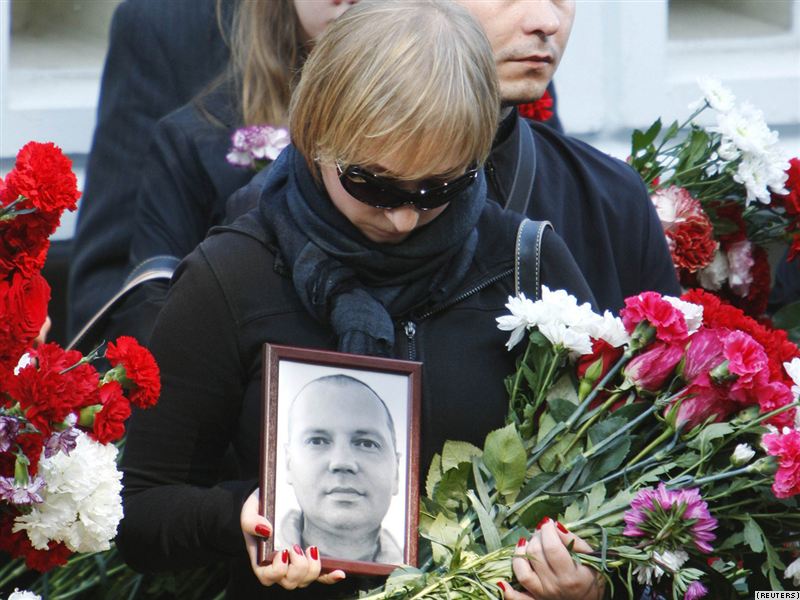
Head of Charter-97 Website Dies in Mysterious Circumstances
Publication: Eurasia Daily Monitor Volume: 7 Issue: 168
By:

On September 3 at 5.30 p.m., a relative found the body of Aleh Byabenin at his dacha in Pyarhurava, not far from Minsk. He had ostensibly committed suicide by hanging himself. Police from the Dzyarzhinsk district reportedly found two empty bottles of balsam in the house as well as an overturned stool.
The head of the Minsk regional police press office, Alyaksandr Danilchanka, declared that there were no “suspicious circumstances” and that Byabenin had committed suicide (Belapan, September 6). The preliminary verdict of the investigator was that at the time of his death, Byabenin was in a severe state of alcoholic intoxication (Narodnaya Volya, September 9).
The death coincided with the arrest of six alleged Russian anarchists said to be responsible for throwing two Molotov cocktails at the Russian embassy in Minsk on August 30. That event sparked a new round of mutual accusations between Minsk and Moscow (Belarusian President, Alyaksandr Lukashenka blamed “Russian thugs”) over who was responsible for the attack (RIA Novosti, September 6).
Aleh Byabenin was born in Kostroma, Russia in 1974. He received a degree in journalism from Belarusian State University and in the 1990’s was the editor of the independent Belarusian newspaper, Imya. In 1998 he was the founder and leader of the website Charter-97, a critical and vigilant observer of the Lukashenka regime in Belarus for the past decade. He was married with two sons (Palityka, September 3).
Charter-97 has waged a lengthy campaign to ascertain the fate of several political leaders in Belarus who disappeared without trace in 1999-2000. Byabenin had downloaded and posted the three episodes of the Russian TV documentary Godbat’ka, which has incensed the Belarusian authorities. In the 1990’s he was abducted briefly by men in plain clothes (Radio Free Europe, September 12).
Several close associates of Byabenin, as well as independent observers, cast doubt on the peremptory verdict that he had committed suicide. First, Zmitser Bandarenka, coordinator of Charter-97, noted the discrepancy between the time of death noted by the examiners and that recorded officially. Thus a forensic expert stated that the time was 2:00 p.m. on September 3, but the death certificate stated September 2, a difference of at least 14 hours. Furthermore, text messages received from Byabenin indicated his intention to go to the October cinema in Minsk at 8:00 p.m. for the premiere of a movie. He and his family had just returned from a holiday in Greece (www.charter97.org, September 4).
Moreover, Andrei Sannikau, a close associate of Byabenin who was backing the former’s presidential election campaign, visited the dacha and stated that he did not believe the suicide story (www.charter97.org, September 4). There was no suicide note, the two had made detailed plans for the future, and the interior ministry was publicizing details of his suicide without awaiting the results of an official investigation. In his campaign Sannikau had called for cooperation with both Russia and the European Union, in contrast to Lukashenka’s official slogan of “Belarus is not Russia!”
Several friends of Byabenin also voiced doubts about the official cause of death. Svyatlana Kalinkina, chief editor of Narodnaya Volya, stated that the idea of suicide was “absolutely unbelievable.” Kalinkina found it incredible that someone contemplating suicide could have planned to go to the movies (Belorusskiy Partizan, September 4). Others, writing on the Facebook website, commented that Byabenin, as a connoisseur of Scotch, would not have consumed two bottles of balsam.
Head of the Belarusian Free Theater, Mikola Kalyazin, who was a friend of Byabenin for 16 years, noted that Aleh, a happy family man with two small children, had never suffered from depression. He had headed the news section of Imya at the age of 20, had no equals in his field of expertise, and was personally responsible for the popularity of the Charter-97 website (Belorusskiy Partizan, September 4).
Kalinkina noted elsewhere that after the explosion on Belarus’ Independence Day two years ago (EDM, Jul 22, 2008), the security services were revamped and the hard-line Viktar Sheiman had resigned. Kalinkina speculated that there might be a campaign within the agency to reinstall him by instigating various provocative acts (Nasha Niva, September 5). A day after this article appeared, Kalinkina found a postcard in her mailbox purporting to derive from the “Tell the Truth” campaign, casting aspersions on her character and stating that “a hunt for betrayers has started!” (www.naviny.by, September 6).
The political situation in Belarus today is exceedingly complex. A decade ago, the clampdown of the Belarusian authorities on a recalcitrant and troublesome website would have been straightforward. However, the high-level disputes between the Belarusian president and the Russian government have introduced a new dimension. Russia publicly accuses Lukashenka of murder and then a leading oppositionist is found dead.
Yet, if the answer to the puzzle of Byabenin’s tragic death is to be found in Moscow, then why have the Belarusian police and forensic authorities resorted to such subterfuge? Why have they rushed to such immediate conclusions when, for example, the perpetrators of the 2008 bomb attack have yet to be found? Conversely, if the Belarusian authorities or secret services are involved, then what goals did they have in mind? Neither Sannikau nor anyone at the website was likely to discontinue their activities. A political murder serves only to further blacken the name of Lukashenka in the West. Are the security services out of control? It may be some time before the answers to these questions will be known.




